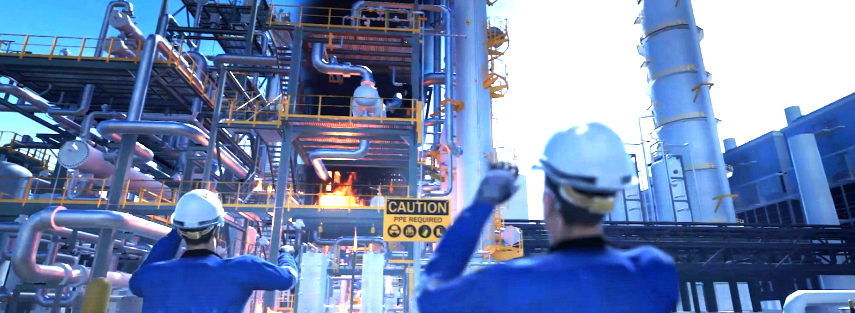3 Reasons why Virtual Reality is Mandatory for Industrial Training
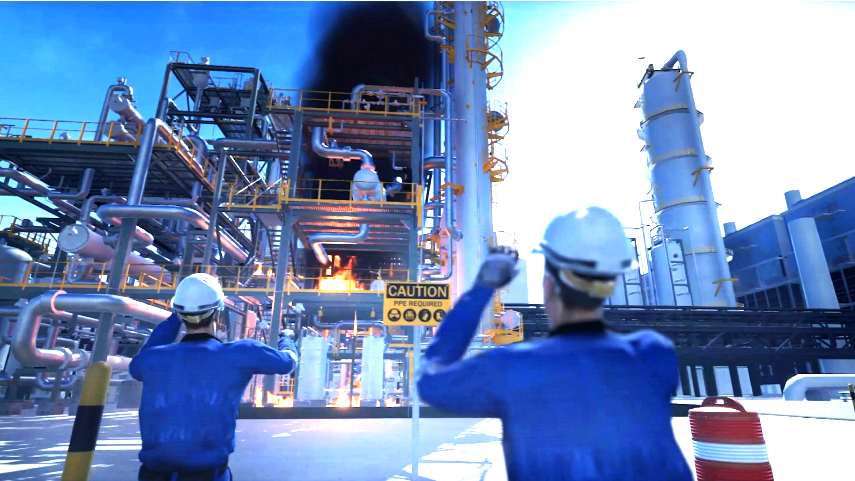
Training employees to handle complex machinery and industrial equipment is crucial in industries. However, traditional hands-on training can significantly drain a company’s finances. Think about it: equipment maintenance, material expenses, instructor fees, and not to mention, the time spent away from regular duties. All add up to a hefty investment.
Then there’s learning effectiveness. With traditional methods, there’s a risk of information overload or, worse, critical steps slipping through the cracks. Not exactly ideal for a high-stakes environment like a power plant or an aerospace facility.
And let’s remember safety. In industries where one wrong move could spell disaster, safety isn’t just a priority—it’s non-negotiable. Yet, with traditional hands-on training, there’s always that lingering fear of accidents or injuries. After all, practice makes perfect, but it also makes room for mistakes.
So, there you have it: the triple threat of challenges facing industries when it comes to hands-on training over machinery and processes. But then… where there’s a challenge, there’s also an opportunity for innovation. Enter virtual reality (VR) training—the solution to revolutionize how we train employees in these high-stakes industries. Virtual reality (VR) is fast becoming the “standard way to train the industrial workforce” because it is:
- Safe: Virtual environments prevent real-world risks during training.
- Effective: Complex processes can be practiced, errors made, and skills honed virtually & repeatedly.
- Cost-Efficient: VR reduces physical setup expenses, travel, and material consumption.
Let’s look at each of these in more detail below:
Learning Effectiveness Amplified
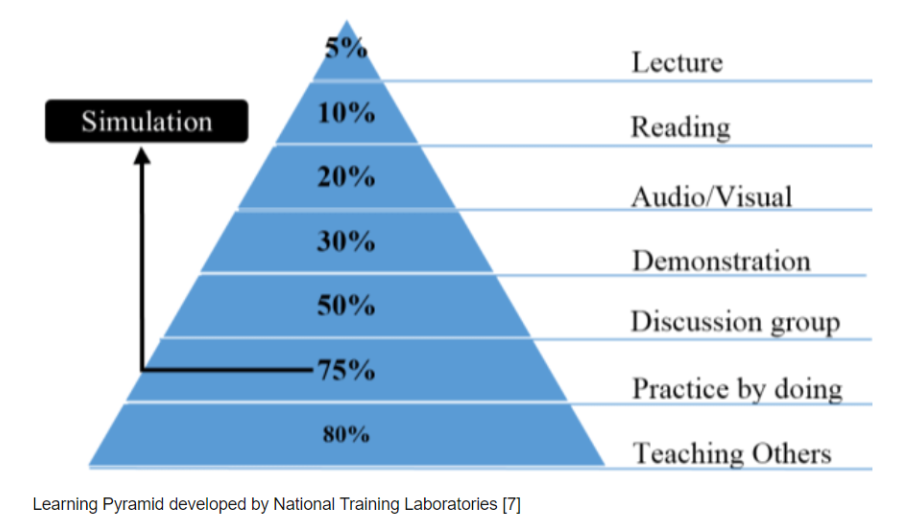
One of the most significant impacts of VR in workforce development is its ability to amplify learning effectiveness. Traditional training methods often struggle to keep up with the fast-paced nature of modern industries, leading to lengthy and inefficient training processes. However, with VR training, learning effectiveness is taken to new heights.
Studies show that people can keep in mind about 75% of what they learn through VR training, which is much better compared to traditional methods where only around 10% is remembered. VR training lets workers dive into a virtual world where they can practice and interact with tasks. This makes it easier for them to recall the steps and procedures needed to get things done. It’s more effective than just reading instructions or watching videos. In industries like manufacturing, energy, and construction, where safety and precision are crucial, VR training is especially beneficial. In manufacturing, workers can practice handling machinery without the risk of accidents. In the energy sector, they can learn how to deal with dangerous situations safely. And in construction, VR helps workers coordinate complex projects more efficiently.
Cost-Efficiency Unleashed
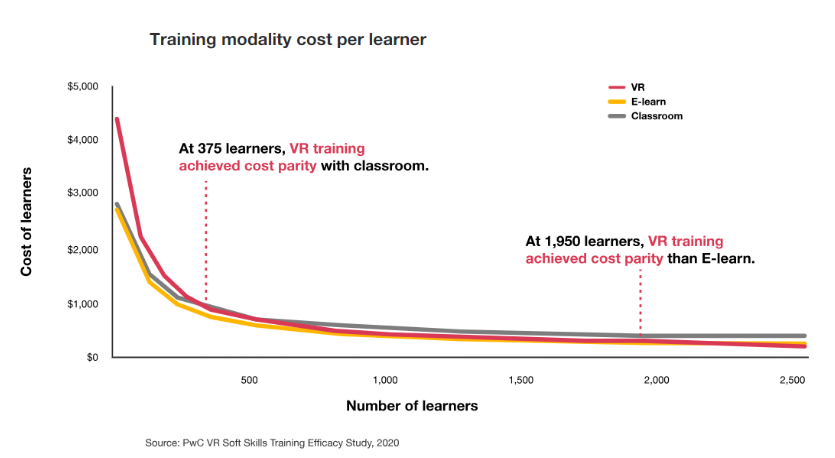
In addition to its unmatched learning efficiency, VR training also offers significant cost savings for organizations. By reducing the need for physical training facilities, travel expenses, and instructor fees, VR training helps organizations streamline their training processes and allocate resources more effectively.
As the number of learners increases, VR training becomes increasingly cost-effective compared to traditional classroom or e-learning methods. This scalability and cost-efficiency make VR training a smart investment for businesses looking to optimize their training budgets and maximize ROI. This study by PwC indicates that VR training reaches cost parity with classroom learning at 375 learners and surpasses the cost-effectiveness of e-learning with just 1,950 learners. Note that this study was done in 2020. Recent innovations in no-code VR training content authoring tools further increase the cost efficiency of creating VR training content. This allows organizations to derive ROI with upto 90% lesser learners compared to traditional VR content authoring tools like the use of Unity engine.
Safety Enhanced
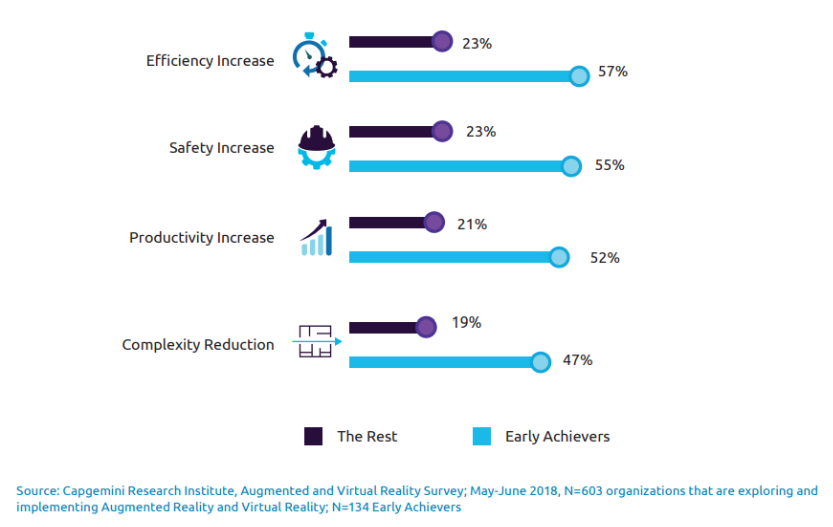
In addition to its advantages in learning and cost, VR training is vital for improving safety in different industries. It plays a crucial role in immersive training, offering employees safe environments for learning and decision-making. By simulating real-world scenarios, VR reduces the risk of accidents during training and on the job. Research indicates that a substantial number of companies achieve over 10% operational benefits through AR/VR implementations, surpassing expectations in areas such as efficiency, productivity, and safety.
The above figure, based on data from a survey by Capgemini Research Institute, reinforces the advantages of early adoption. Early achievers experience improvements exceeding 20% across key metrics: efficiency, safety, productivity, and complexity reduction. Notably, industries like automotive manufacturing and mining leverage VR to enhance safety practices significantly. For example, Ford’s use of VR to redesign assembly line tasks resulted in a 70% decrease in employee injuries and a 90% reduction in ergonomic issues. Similarly, VR safety training in mining led to a remarkable 43% reduction in lost work time due to injuries, demonstrating its effectiveness in promoting safety awareness and readiness among workers.
Conclusion
In conclusion, Virtual Reality training is revolutionizing the way industries approach workforce development. By amplifying learning efficiency, unleashing cost-efficiency, and enhancing safety measures, VR training empowers organizations to stay ahead in today’s competitive landscape. As technology continues to evolve, the possibilities for VR training are endless, and the future of workforce development has never looked brighter.

